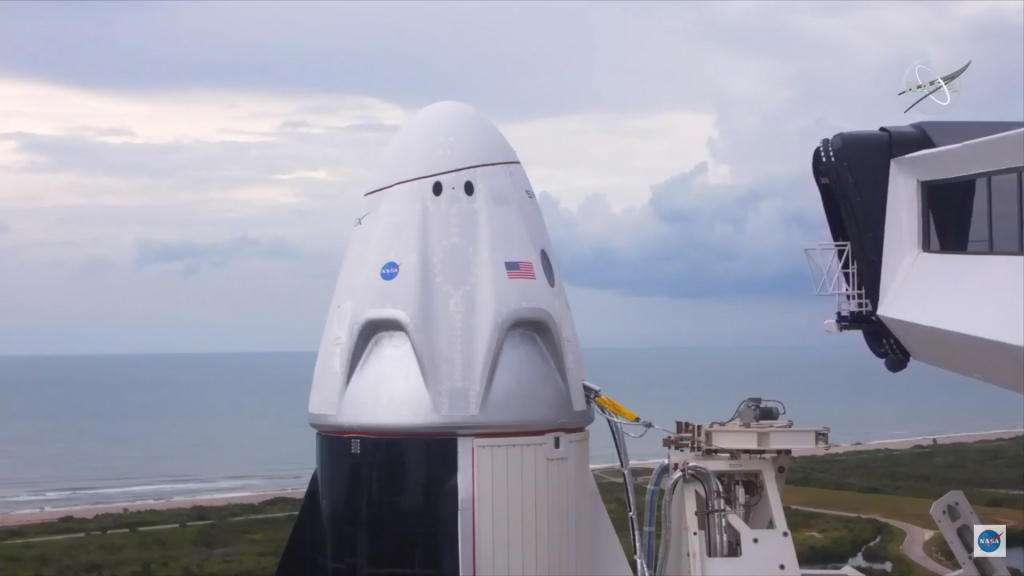
Get the world’s most fascinating discoveries delivered straight to your inbox.
You are now subscribed
Your newsletter sign-up was successful
Want to add more newsletters?
Join the club
Get full access to premium articles, exclusive features and a growing list of member rewards.
SpaceX will have to wait a few days to make history.
Elon Musk's company was scheduled to launch its first-ever crewed mission, a test flight to the International Space Station (ISS) called Demo-2, this afternoon (May 27) from NASA's Kennedy Space Center in Florida. But bad weather has nixed that plan, pushing the liftoff back to Saturday (May 30) at the earliest, NASA and SpaceX officials announced today.
"We continue to violate a couple different weather rules that we now do not expect to clear in time to allow for a launch today," SpaceX launch director Mike Taylor said about 20 minutes before the planned liftoff. "We’re going to go ahead and end today’s launch attempt."
Full coverage: SpaceX's historic Demo-2 astronaut launch explained
Saturday's launch would occur at 3:22 p.m. EDT (1922 GMT). If that doesn't work out, SpaceX could try again on Sunday (May 31) at 3 p.m. EDT (1900 GMT). (Demo-2 has an instantaneous launch window; the capsule must launch at a specific time, when the space station is at a certain spot in its orbital path.)
Whenever the liftoff occurs, you can watch it live here at Space.com.
Demo-2 will send NASA astronauts Bob Behnken and Doug Hurley to the ISS aboard SpaceX's Crew Dragon capsule. The mission will be a milestone for the entire nation as well as for SpaceX: no orbital human spaceflight has launched from the U.S. since NASA retired its space shuttle fleet in July 2011.
Get the world’s most fascinating discoveries delivered straight to your inbox.
Since then, Russian Soyuz spacecraft have been astronauts' only rides to and from the ISS, at a cost (most recently) of about $90 million per seat. NASA isn't thrilled with this dependence and is counting on SpaceX and Boeing to break it.
In 2014, the two companies signed multibillion-dollar contracts with NASA's Commercial Crew Program to complete development of their astronaut taxis and fly six operational missions to and from the ISS for the agency. Demo-2 is the last big hurdle SpaceX must clear before it can start those contracted flights.
Boeing still has some work to do before its vehicle, a capsule called CST-100 Starliner, can carry astronauts. Starliner did not manage to rendezvous with the space station as planned during an uncrewed test flight this past December; Boeing will refly that mission before attempting a crewed flight.
SpaceX aced its uncrewed ISS flight, a mission called Demo-1, in March of 2019. The company performed another critical uncrewed flight test in January of this year, demonstrating Crew Dragon's emergency-escape system, which is designed to blast astronauts to safety in the event of a problem during launch.
This latter test was a dramatic affair, involving the intentional destruction of one of SpaceX's Falcon 9 rockets mid-flight.
Visit Space.com for complete coverage of SpaceX's Crew Dragon Demo-2 flight.
- Meet the NASA astronauts launching on SpaceX's historic Crew Dragon test flight
- Here's what SpaceX's 1st spaceship to carry astronauts looks like from space (satellite photos)
- SpaceX's Crew Dragon Demo-1 test flight in pictures
Mike Wall is the author of "Out There" (Grand Central Publishing, 2018; illustrated by Karl Tate), a book about the search for alien life. Follow him on Twitter @michaeldwall. Follow us on Twitter @Spacedotcom or Facebook.
OFFER: Save 45% on 'All About Space' 'How it Works' and 'All About History'!
For a limited time, you can take out a digital subscription to any of our best-selling science magazines for just $2.38 per month, or 45% off the standard price for the first three months.

 Live Science Plus
Live Science Plus












